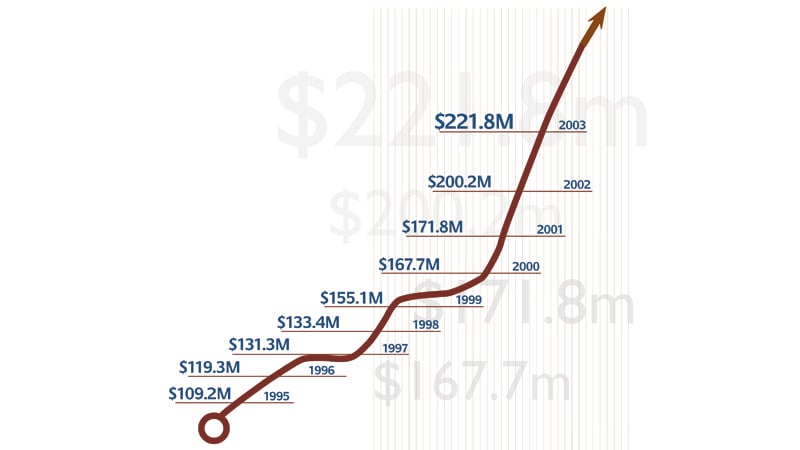The growth of residual payments has been stunning. In 1994, the DGA collected approximately $93.6 million in residual payments on behalf of Guild members and their estates. By 2004, that number approached $240 million, representing a more than 150 percent jump in the amount of funds collected. Over the past decade more than $1.6 billion has been gathered, processed and forwarded to DGA members and the DGA Basic Pension plan, which is also largely funded by residuals. With industry growth, improved policing, and successful negotations by the DGA, prosepects for the trend in continued residuals growth is strong.
What Are Residuals?
Residuals are payments made to directors and sometimes below-the-line members involved in the making of motion pictures and television programs when those properties are rebroadcast or distributed via a new medium. In general there are three types of residual payments: gross receipts-based, fixed fee- based, and subscriber-based.
Gross receipts-based residuals are generally payments for theatrical films made to DGA members for a film exploitation on media other than the movie theater (e.g.: DVD/Videocassette, Pay Television, Basic Cable and Free Television). Fixed fee and subscriber-based residuals are payments made for the reuse of television programs, based on rerun activity or other exhibition events. Each of these residuals are based on formulas determined by a complex set of contractual provisions, depending on what market the program was made for, and where it is being re-used.
Residuals aren't based on profitability. They are payable regardless of whether or not the project ‘breaks even.’
A Brief History
The concept of compensation to authors for reuse of their work was first established in Europe in the 19th Century. Residuals in the United States began in the early days of live radio, when actors had to perform twice: once for the Eastern time zone, and again three hours later for the Pacific time audiences. With the advent of recording technology, the networks would just record the first performance and replay it later. The talent Guilds successfully demanded that their members receive compensation for those rebroadcasts. The DGA, along with the other talent Guilds, negotiated residuals for domestic reuse of TV programs by the mid-1950s. 1961 saw the first residuals for feature films and 1968 ushered in residuals for foreign reuse of television programs. 1971 saw the first payments for videocassettes and pay television reuse. In 1981, Made for Pay TV residuals were negotiated and in 1999, residuals for high budget dramas on basic cable came into effect.
The Guild also collects money from beyond our borders in the form of Foreign Levies. Foreign levies are payments the DGA receives from European collection societies that stem from taxes and levies imposed on blank cassettes, recording devices and rentals. Since the program’s inception in 1990, the DGA has collected tens of millions in foreign levies from various European countries. A more in-depth report on the Foreign Levies program, its history and impact will be published in an upcoming issue of DGA Monthly.
Who Gets Residuals?
Directors receive residuals for all the types of reuse previously mentioned. Unit Production Managers, Assistant Directors, Associate Directors and Stage Managers are also eligible for residual payments on videocassette/DVD and Pay TV reuse of Features and programs which are made for Free and Basic Cable television. Directors and crew members share all residuals for reuse of programs made for Pay Television. The DGA Basic Pension Plan gets a large share of residuals generated by theatrical films.
Collecting Residuals
To ensure that members receive what they are due requires a great amount of strategic planning and hard work. The Guild starts working to protect your residuals before you start work on a project. For most productions, the DGA Signatories and Reports Compliance Department ensures that potential signatory companies are vetted by the Guild so that residuals will actually be paid when due years in the future, when the production company may have long since released its interest in the film or gone out of business altogether. These “financial assurances” most commonly are in the form of assumption agreements and guarantees from parent companies, security agreements, and residual reserves. This process can be complex and contentious, but it has saved Guild members and the Pension Plan millions of dollars in residual payments. By working with the Guild, even the lowest production budget levels have been able to meet residuals obligations. And in 1998, the DGA successfully championed historic legislation in the US Congress that ensured that when ownership of films is transferred, new owners or distributors would be legally obligated to pay residuals to directors, writers and actors as provided by their collectively bargained agreements.
Companies report earnings to the Guild and are required to send checks made payable to members to the Guild for transmittal to the members. Last year the Department processed nearly 280,000 residuals transactions. Once the checks arrive, the 16 members of the DGA Residuals Department staff use the back-up information that is attached to log the payment details into the DGA Residuals system and then the checks are mailed to the members. This task helps the Guild verify the accuracy of the payments and determine that all payments are being made when they are due.
The DGA Residuals Department monitors industry compliance with the reuse provisions of the DGA's negotiated agreements, and aggressively enforces these agreements worldwide via computerized policing systems, audit programs and claims mechanisms which target producers who fail to meet their obligations. If the Residuals Department identifies a delinquency which the production company or distributor refuses to pay, they call on the Guild’s Legal Department to pursue the delinquency by filing a claim for arbitration. These claims can lead to court judgments and foreclosures, if necessary. The Guild also represents members' residuals interests related to bankruptcy filings and library acquisitions.
While the DGA makes every attempt to cover every project without the need for member assistance, should you have any questions about a project or believe you are owed residual payments you have not received, please contact the DGA Residuals Department at 310-289-2060.
Tips from the DGA Residuals Department
- Keep your address updated. The DGA forwards your checks to the most current address listed with the Guild.
- Before depositing a residuals check in your bank account, please be sure that it is made payable to the correct entity (either to you as an individual or your loan-out corporation). There may be tax penalties involved and companies may not be able to correct any such errors once a check has cleared.
- You must declare any residuals you receive as income during any time period in which you receive Unemployment benefits. The Employment Development Department strictly enforces this rule and there are penalties for failing to declare residuals as income.
- The DGA is actively seeking beneficiaries whose residual checks have been returned to the Guild due to incorrect addresses, and/or the legal beneficiaries of deceased members for whose estate the Guild is holding residuals. A “Missing Beneficiaries” list will be published in future issues of the DGA Monthly and posted on the DGA website.





